Make your tractor a tough target for thieves
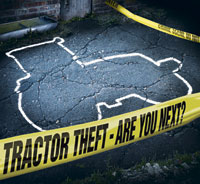
Thefts of farm machinery, especially tractors and telehandlers, are rising fast. David Cousins and Nick Fone look at how the industry is fighting back
There’s nothing new about farm theft, surely?
True. Farmers have always been the target of opportunist theft, mostly involving ATVs, workshop kit, livestock trailers and 4x4s. But thefts of tractors and telehandlers have been relatively rare in the past, unless you were unlucky enough to be farming on the edge of a big city.
So what’s changed?
Blame car-makers for this one. Until about 10 years ago, thieves could make a nice living by stealing expensive motors. But with new cars now bristling with immobilisers, alarms, trackers and high-tech keys with rolling codes, they have shifted to less security-conscious sectors like construction and agriculture.
The level of professionalism of thieves targeting farms has risen too. Where once it was semi-amateur local tea-leaves, it’s now often organised gangs stealing to order.
And the prizes for a competent thief are considerable. A common-or-garden 150hp tractor has a list price of £60,000-£70,000, while a 250hp will be nearer £100,000
How bad is it getting?
Pretty bad. Some 5624 tractors, telehandlers and ATVs were stolen in 2007, amounting to a cost of £20.9m.
By 2008 that had risen to 6481 machines worth a total of £22.9m, according to figures collated by the NFU Mutual but representing machines insured by all the different insurance companies. Figures for 2009 will be out soon and are expected to show a similar rise.
What’s changing is that more and more thefts are carried out by organised groups stealing to order. And many of the farms targeted are ones that have never had a theft problem before.
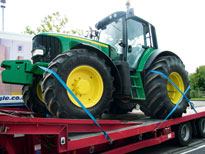 |
|---|
| John Deere tractors are increasingly popular with thieves. |
What are the most commonly targeted items?
Among bigger kit, it’s telehandlers, tractors, ATVs, pick-ups, stock trailers and even the odd self-propelled foragers.
Tools and batteries are still a traditional favourite but GPS kit (which can be worth £10,000 on a single tractor) is increasingly being stolen too.
These thefts don’t always happen in the middle of the night, either. The thieves will often observe a particular machine for a day or two, then arrive one afternoon when no one is about and load it on a truck.
The latest figures from the newly-formed Plant and Agricultural National Intelligence Unit (PANIU) reveal that 20% of the 5700 farm and construction machines reported stolen in the UK have a JCB badge on them.
However, John Deere kit moved up to second position in the six months from July to September 2009, largely because of its popularity in Eastern Europe.
In fact tractors are now the second most popular item to be stolen, overtaking old favourites like telehandlers, dumper trucks and backhoe loaders.
Of the 1265 trailers reported stolen between October 2008 and October 2009, more than 80% were made by Ifor Williams. That doesn’t mean that Ifor Williams trailers are particularly easy to steal, just that they are popular and desirable.
Are tractors really that easy to steal?
Oh yes. Most tractor makers still operate a one-ignition-key-fits-all system, meaning that if you have, say, several models of New Holland tractor, any key will fit the ignition of all of them. Very useful if one of your tractor drivers accidentally takes the key with him, of course
Cab door keys are sometimes unique to a particular tractor, and are fine for keeping kids out of the cab. However anyone wanting to get into the tractor need only tap the rear window with a spanner to shatter it.
Steering locks are largely non-existent in tractors, as are immobilisers (unless you’ve bought an aftermarket one) or ultrasonic alarms of the sort commonly found in higher-spec cars.
What are my chances of getting it back?
It’s reckoned that just 5% of machines stolen from farms and construction sites are ever recovered, compared to 50% of cars. The organised groups who are now thought to be responsible for many of these thefts are pretty adept at changing number plates and grinding off serial numbers and identity plates.
Most tractors go to Europe through the channel ports. With 9000 vehicle movements a day through Dover east dock alone, routine checking of lots of loads is minimal.
However in the last few months, the police have started to get some of these machines back – in the most recent case three stolen tractors were recovered from Poland.
Surely the details of all tractors sold is held by the DVLA?
Certainly, the DVLA database holds vehicle identification numbers (VIN), V5 registration document details and index numbers (number plates) of all vehicles that use the public highway – including tractors, combines, telehandlers and self-propelled foragers.
So, potentially, any police officer stopping a dodgy truck with some nice farm kit on it would have access to the DVLA data to check whether the truck’s cargo was kosher. However number plates can be easily swapped and VIN numbers ground off and replaced with fake ones.
Equally, companies like HPI which provide a useful service for people about to buy cars – ie alerting them if that vehicle has been stolen, written off, cloned or still has outstanding finance – don’t offer a similar service for tractors or telehandlers
Shouldn’t the machinery manufacturers take some responsibility for this?
Security hasn’t been a priority for manufacturers until now, partly because theft levels have been relatively low.
Indeed, one of the problems with farm machinery theft is that traditionally it’s been a crime without a victim. The farmer gets a new tractor (and only a minimal jump in premium unless it happens a lot) and the manufacturer gets to sell a tractor that he wouldn’t have sold otherwise. The insurer bears the cost but, like credit card theft, it’s built into the business model.
However it’s becoming plain that there are victims. The tractors are increasingly sold for cash, giving the criminals a great way to launder money. That will then be used to finance drug smuggling and other criminal activities. And anyway, would you want to know thieves had been in your yard?
So what is the industry doing about it all?
Until now very little, but it’s all changing. There are now four weapons in the good guys’ armoury – equipment registers, tagging, immobilisers and tracking – that are beginning to make the thief’s life less comfortable.
The top six rural insurance companies, NFU Mutual, Allianz Engineering, Aviva, HSB Engineering Insurance, RSA and Zurich also began funding a specialist police unit in October 2008 to try to cut the level of machinery thefts. Called PANIU, it has five staff identifying stolen machinery, maintaining an accurate database of stolen kit, working with auctions and 2nd machinery websites as well as training police officers on how to identify stolen machinery (not as easy as it sounds).
How does a register work?
The best-known specialist register is TER – the National Plant and Equipment Register. It started life in 1995 as an art register, but quickly moved into construction equipment and then farm equipment.
Farmers register the make, model, serial number and registration number of their most nickable machines. If a machine is stolen, they inform TER which marks that machine as stolen on its database.
Meanwhile, the next time the police stop a dodgy low-loader carrying two shiny tractors at 2am, they can key in the tractors’ details. If they flash up as stolen, then the farmers get their tractors back and the felons (hopefully) get charged.
TER also operates a useful check scheme. Say you’ve spotted an attractive-sounding, low-hours telehandler in the local dealer’s yard or at a sale and fancy buying it? You simply ring (or check online) with TER whether it’s been stolen.
TER says 5% of the 1000 checks it carried out in 2009 revealed a stolen vehicle and another 5% revealed a machine that still has outstanding finance.
Registering with TER is free for fewer than five items and £1/machine after that.
What are the drawbacks with registers?
A register is potentially a powerful tool as it can deter thieves from taking things in the first place. But it needs the bulk of farmers to take part and people buying secondhand to register their machines too. This is something that TER is aiming for, but admits that getting farmers to take part can often be a struggle. There’s also an ongoing task of training police officers in where to look on different types of machines for ID marks.
What about tagging?
Liquids that contain a DNA-style forensic signature (under trade names like Smartwater) have become more popular in recent years. You paint them on valuable items, then if they are stolen and the police recover them they know they’re yours. Costs start at about £75 for a kit suitable for a sole trader. Only any good if the goods are recovered, of course
Clever, but isn’t there anything a bit more sophisticated than that?
Yes, there is. In September 2009 the/ Agricultural Engineers Association (the umbrella body for farm machinery makers and importers) joined forces with the Construction Equipment Association (the equivalent body for construction equipment makers) to open up the latter’s two-and-a-half-year-old CESAR (Construction Equipment Security and Registration) scheme to farm machinery.
Security specialist Datatag was taken on to operate a combined tagging and registration scheme. This involves fitting four distinctive triangular registration plates to the tractor or handler’s bodywork and chassis so potential thieves know it’s tagged.
At the same time small transponders are fitted to hard-to-get-to places around the machine. They have no battery and emit no signal so they can’t be easily detected by thieves. However when the right scanner is used they give off a unique code number.
Finally, forensic DNA is painted on various areas around the machine.
All this, says Datatag, means that police have an easy means of checking who the machine belongs to – even if the thieves have changed the number plates and ground off the chassis and number plates.
Some 25,000 construction machines have been fitted with it, says Datatag, and 45-50% of all new construction machines come with it. It says that machines with the system are four times less likely to be stolen and six times more likely to be recovered than those without it.
Tagging machinery in this way also means that ordinary members of the public can help recover stolen equipment. In September 2009 a man walking in the fields near Bradford came across a JCB telehandler parked in the corner of a field.
He saw the CESAR registration plate and contacted Datatag. A search of the database revealed that the machine had been stolen a few weeks before. The police were informed and the telehandler recovered.
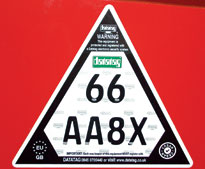 |
|---|
| Four of these hard-to-remove triangles are fixed on the machine. |
What does tagging cost?
Several tractor makers (including McCormick and Landini on the tractor side and JCB, Manitou and Merlo on the handler side) are now fitting Datatag as standard on new machines at no extra cost.
You can have an existing machine Datagged for £109 (including fitting). Fitting is done by either of two nationwide companies, Pirtek and Enigma Security and some farm machinery dealers are expected to offer the service soon too.
Any drawbacks?
The police need to spot the lorry scuttling off with its illicit load in the first place. They need to have the right scanner and know how to use it. The database details need to be up to date, too (less likely if the machine has been sold on).
What about immobilisers?
Cars have had these for years, but they’re finally trickling into farming. Electric or electronic units put a break into one or more electrical circuits that can only be completed by touching a keyfob transponder on a plate or keying in a number on a keypad.
The more sophisticated ones will apply a similar blocks on hydraulic lines, fuel lines, and even deactivate the clutch pedal, as well as immobilising one or more electrical circuits. Costs range from £150 to about £650
Any drawbacks?
The cheap ones probably won’t hold off a skilled thief as long as the expensive ones, but they are certainly likely to deter amateur thieves.
Some of the keyfob transponders can be expensive to replace if you break them, so check the replacement cost before you sign the cheque. Also bear in mind that if one tractor driver has gone off with the key in his pocket, no-one else will be able to drive that machine.
Systems with a keypad, on the other hand, mean that the key can stay in the ignition all the time (other than at night) and any driver who knows the code can start the machine up. More sophisticated systems allow different codes for different drivers plus a master code for the boss (who can cancel any of his driver’s access codes if he needs to).
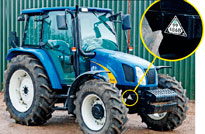 |
|---|
| Datatagged New Holland tractor with one of the stickers highlighted. There are four on each machine. |
What about tracking devices? How do they work?
Tracking devices have been around on expensive cars for years and most work on the same basic principle. You hide a tracker unit (which range in size from a cigarette packet to a paperback book) somewhere on the machine, either wired into the vehicle’s 12v system or relying solely on its internal battery.
It contains a GPS receiver, so it knows exactly where it is in the world. It communicates with the owner by text via the mobile phone network, and some units add other technologies like Cell ID (using the nearest three mobile phone masts to triangulate in on the unit) and RFID (Radio Frequency Identification).
The latter involves small chips hidden in the machine that give off a low-power signal if someone with a suitable scanner is near.
Owners will generally set the unit to automatically send them a warning text if the machine moves without their knowledge. Or they can set what’s called a geofence – ie choose a set of roads that will act as a perimeter.
If the GPS unit detects that it has strayed outside of them, it will automatically send a warning text. If you have a smartphone (ie an internet-enabled mobile phone) more sophisticated units will send you the exact position of your machine overlaid on a Google map.
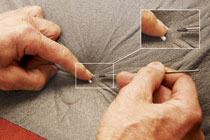 |
|---|
| Small transponders are fitted in inconspicuous places. They are read with a scanner. |
Clever stuff, but GPS signals aren’t good at passing through metal, so if the stolen vehicle is shoved in a shipping container anyone looking for it will quickly lose the scent.
However GSM/GPRS mobile phone signals will go through metal, so some makers also fit a cell ID system as well. This uses the three nearest mobile phone masts to allow a special scanner to triangulate in on the stolen vehicle with an accuracy that is good enough to narrow its position to, say, a set of farm buildings.
Still wondering where it is? Some tracker units also add an RFID (radio frequency identification) capability. This is a low-power transmitter (of the sort used by naturalists to tracks the movements of wildlife) that can be tracked down to within a few feet by the right receiver.
Cost?
Typically £200-300 for the unit (generally self-fit) + anywhere between £5 and £10 for the data feed (texts etc). See box for list of makers.
Any drawbacks?
A couple. They’re relatively costly, especially if you have several units. They need to be well hidden – some thieves will know where to look for them. And, as mentioned, if the vehicle is shoved in a metal shipping container its GPS unit won’t work. And Cell ID triangulation systems may not work as well in rural areas where the transmitters are relatively far apart..
Also, the police may not be prepared to get the machine back once you have located it – you may have to do that yourself or get a security firm to do it for you.
Can I get money off my insurance if I have these devices?
From November 2009, the NFU Mutual (which has a big share of the construction and farm machinery insurance market) came up with a joint discount scheme. Other insurers have come up with their own schemes, too.
The NFU’s works on the basis that the more security equipment you have, the more discount you will get.
Equipment | Discount Rate | Saving tractor | Saving handler |
CESAR registration | 12.5% | £82 | £69 |
Thatcham-approved immobiliser P2 | 7.5% | £49 | £41 |
Thatcham-approved tracker P5 | 15% | £99 | £82 |
CESAR + immobiliser | 20% | £132 | £110 |
CESAR + tracker | 27.5% | £181 | £151 |
* Based on a typical £660 annual comprehensive premium for a 140hp £40,000 tractor.
* Based on a typical £550 comprehensive premium for a telehandler
So the discount can offset quite a bit of the cost of the equipment. If you replace your tracker every three years (annual cost £100) and data charges cost £100/yr (ie £200/yr) and the discount on your insurance is £181, your real costs is just £20/year.
What does Thatcham approval mean?
Thatcham is a private company that – among other things – tests vehicle security devices. A lot of it involves seeing how long it takes a thief to overcome them.
However there are quite a few companies who claim their equipment is just as effective, even though it’s not Thatcham approved.

